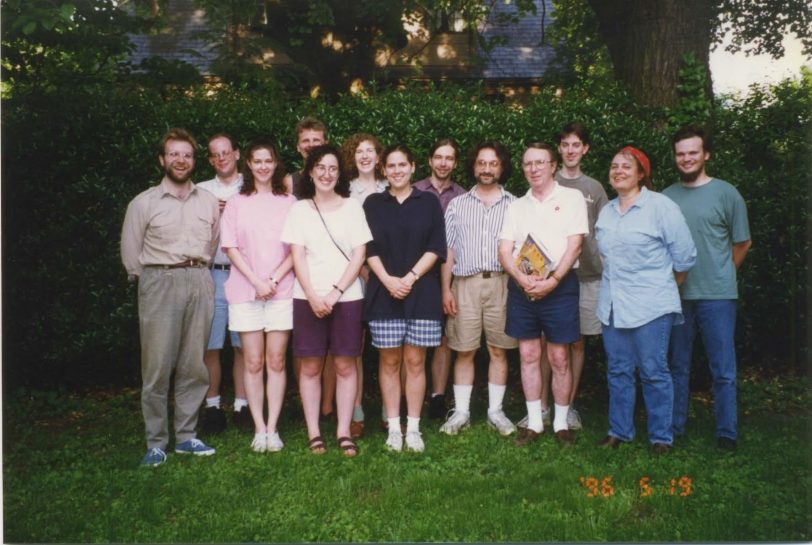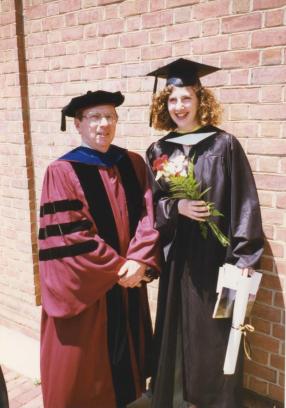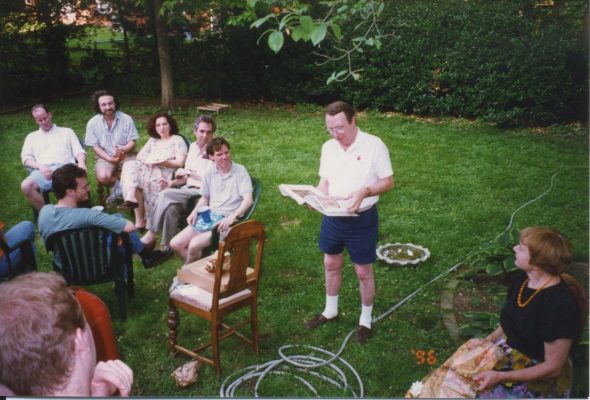Welcome back! We’re starting off a series we’re (un)interestingly calling “An Interview with…” where we interview former SAM members who are currently working in the Archives Field. Our first interview is with Jodi-Allison Bunnell, one of SAM’s founding members!
1. Tell us about yourself.
I’m a 1996 of the HiLS (History and Library Science) dual masters program of what was then the College of Library and Information Science at the University of Maryland at College Park.
SAM’s party for Dr. Burke honoring him at his retirement, May 1996. (Paul Lagasse, Bob Vietrogoski, Heather Moore, Tobin Conly, Jennie (Levine) Knies, Jodi Allison-Bunnell, Stacy (Finley) Davis, David McCartney, Alan Haeberle, Dr. Burke, Matt Brown, Unidentified, Michael Randers-Pehrson)

SAM’s party for Dr. Burke honoring him at his retirement, May 1996. (Paul Lagasse, Bob Vietrogoski, Heather Moore, Tobin Conly, Jennie (Levine) Knies, Jodi Allison-Bunnell, Stacy (Finley) Davis, David McCartney, Alan Haeberle, Dr. Burke, Matt Brown, Unidentified, Michael Randers-Pehrson)
2. What did you like best about being a member of SAM and/or what was your favorite event or memory?
I made friends and colleagues who are part of my professional and personal network to this day! The wonderful world of Facebook makes that more facile than before, but the relationships make the connections. What a pleasure it is to see people at conferences who I’ve known for so long.
3. Did you have a favorite professor? Who?
Both of the archives specialists who were part of the CLIS faculty at the time were wonderful, and for different reasons. Dr. Frank Burke was my advisor on the CLIS side (as a HiLS student, I also had an advisor on the History department side) and a wonderful mentor and friend. A Ph.D historian who had worked at the Library of Congress and NARA he brought a rich collection of stories of the federal agencies and their programs that gave context to the broad themes of the profession: automation, description, access, the relationships between federal agencies. Dr. Marilyn Pettit gave us scenarios around program development and hands-on projects that allowed us to apply and develop our skills. I use what they taught me to this day. A library administrator doesn’t understand why archivists do things in such “weird” ways? Let me give you the administrative history on that! Thorny description problem? Let’s talk about how we could approach it at varying levels of detail, and the resource impacts of each. Weird political situations? I can work with those, too.

Frank Burke and Jodi Allison-Burke at graduation, May 1996
4. How do you think SAM helped you prepare to be an archivist/program manager?
I learned the basics of leadership and management: calling meetings, leading them, advancing an agenda. Probably even more important, it established right away that my professional associations are my lifeline. And indeed, SAA and Northwest Archivists have been that ever since.
5. You were the first president of SAM. Tell us how SAM started. What were the main challenges you faced?
Dr. Burke called me into his office and told me that I would be starting SAM. I really had no idea how to do such a thing: I had never chaired a meeting, written agendas, or anything related to making an organization work. “Be sure to have snacks at meetings,” he told me, and set me to it. I figured a few things out!
6. What is it that you do today?
I work for a consortium that serves the academic libraries of Oregon, Washington, and Idaho, the Orbis Cascade Alliance. I oversee the program that focuses on unique and local content, archival collection management, and an EAD database of almost 30,000 finding aids called Archives West (http://archiveswest.orbiscascade.org/). My work focuses most closely on our 37 member institutions, but I also work with institutions in Montana, Alaska, and Utah. I do this all from a home office in Montana, even though the Alliance offices are in Eugene, OR.
No, this job did not exist when I was in graduate school, and I would have never imagined this is what I’d be doing 20 years later. How did I get here? Some pretty focused work, outstanding colleagues, and quite a bit of luck.
7. Are there any interesting collections where you work that you think the world should know more about?
It’s hard to pick out of 30,000! There are so many, and I’m pleased to be able to help anyone find them.
8. Are you working on any interesting projects?
My current focus involves developing a Digital Public Library of America (DPLA) hub at the Alliance. Since our pre-existing aggregation is of finding aids rather than digital objects, this has been a long process, and an interesting one!
Working across many institutions of varying sizes across several states is a great opportunity to find areas of agreement and commonality.
9. What advice do you have for current SAM members and other students at the iSchool?
Take your involvement with SAM right into involvement with SAA and your regional or state archival organization.
Know that the job you will have 10 or 20 years from now doesn’t exist now—and that that is a good thing! Keep an open mind and create the opportunities you want.

SAM’s party for Dr. Burke honoring him at his retirement, May 1996. The book we presented to him was “Treasures of the New York Public Library.” (Bob, Alan, Cori Vanchieri (Alan’s Spouse), Tom Connors, Michael Henry, back to camera – Michael Randers-Pehrson, Frank Burke, Hildegarde Burke)
10. White gloves or no gloves?
No gloves so long as there is no visible mud on the hands. And if glass plates are not involved.